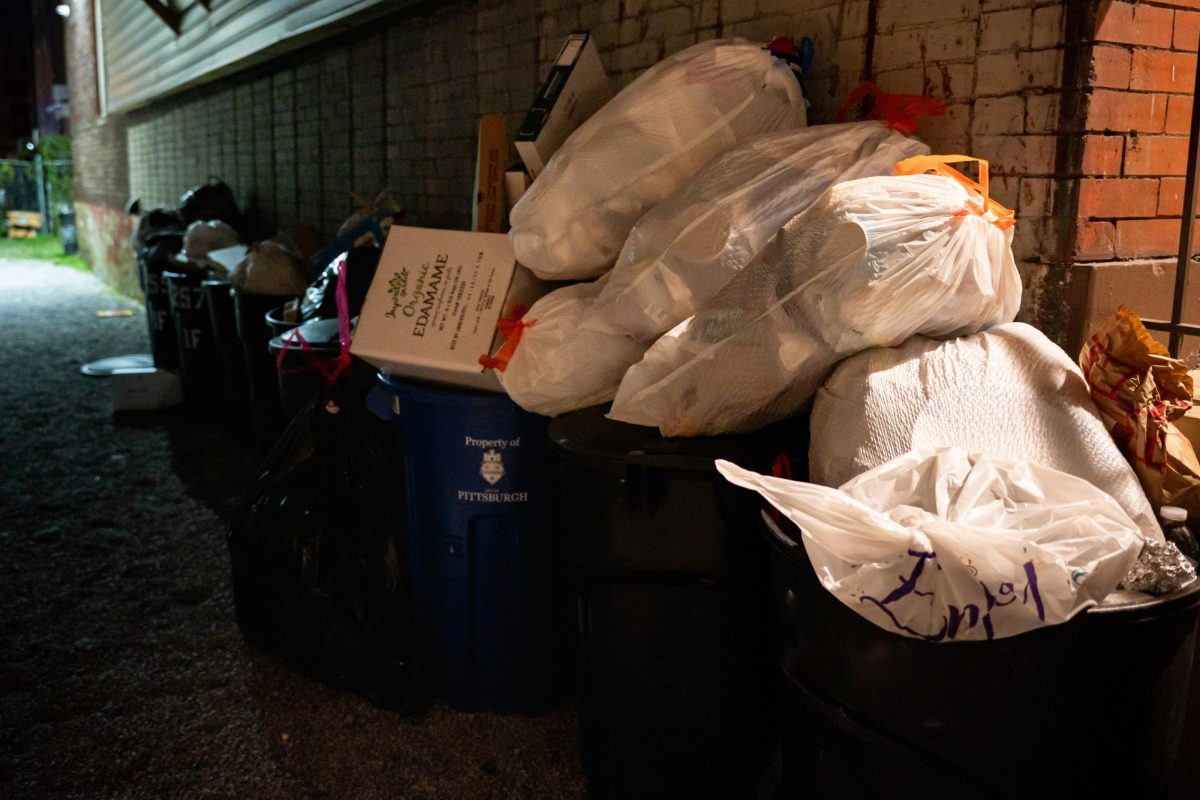Lizabeth Gray, Neighborhood Quality Consultant of Oakland Planning and Development Corporation (OPDC), describes herself as “the queen of trash.”
“It drives me crazy,” Gray said. “I’m also a bit of an upcycler and have been since the first Earth Day. It just drives me crazy to see so much being thrown out and not recycled.”
Trash lines many of the streets in South Oakland where Pitt upperclass students live. Gray said overflowing trash cans, littered streets and recyclables not properly disposed of anger many long-term residents. OPDC and the City of Pittsburgh continue to work together to combat the issue through educational initiatives.
Chris Mitchell, a project coordinator and anti-litter specialist for the City of Pittsburgh, describes the trash issue in Oakland as a never ending cycle. He said by the time students get accustomed with “following the rules,” they graduate, and move away. Once students are educated about disposing of trash correctly, they leave.
“For decades, new students come into Oakland and because they don’t know any better, don’t dispose of their trash properly,” Mitchell said. “The students struggle for a while, and they have very dedicated people like OPDC going around and trying their best to educate the students.”
Gray said one of the best ways to improve the cleanliness of Oakland is to educate students on how to properly dispose of trash.
“Students aren’t lazy,” Gray said. “They’re not stupid. They don’t want to cause trouble. They’re learning. To have information is to have power, and they need to be informed.”
OPDC wanted to create a resource student residents can reference when they have questions about trash pickup. Gray said creating something that appealed to them and is convenient for them was a priority.
“I want a magnet to go on the refrigerator with a QR code,” Gray said. “When you scan the QR code it takes you to a student resource page, and the first thing on the top of the page is the monthly calendar for recycling and trash. There’s other resources about recycling, like how you put the items into the recycling can loose instead of in a trash bag.”
According to Gray, the goal is to get these magnets into every home where students live. At the bottom of the magnet it says “Please leave me here,” so new students that move into the house also have access to the information.
Gray said OPDC volunteers handed out magnets in the beginning of the school year. Now that the block parties are over, Gray said OPDC is going to “start marching around Central Oakland” to give them out.
“We have a couple of people in OPDC doing door knocking to give the magnets out, and we’re always looking for volunteers to help with community actions,” Gray said.
The City of Pittsburgh sends out a newsletter every January regarding trash and how to properly dispose of it. By the time the newsletter arrives, most students will have already lived in their house for at least five months. Omoye Aikhuele, an environmental enforcement specialist for the City of Pittsburgh, felt like the letter wasn’t reaching students in time.
“We realized that meeting the students at the time that they arrive on campus is very important, but we found ourselves limited because we couldn’t always get to students in time,” Aikhuele said. “We do an annual newsletter that comes out in January each year, so halfway through the year students will receive it. By the time the next round of students move into that apartment or house, they don’t have that sheet of paper with important information about trash disposal.”
After feeling like the newsletter didn’t reach all new students living off campus, OPDC and the City of Pittsburgh worked together to create the magnet with a QR code. The magnets debuted about a year ago, and are making their way into homes of students and permanent residents in Oakland.
“It’s all about information flows,” Aikhuele said. “The information wasn’t flowing to the correct population. It takes time to come up with these ideas to make sure that we figured out the best way to target a specific population.”
While tenants are responsible for disposing of their trash promptly and correctly, Alicia Carberry, recycling supervisor for the City of Pittsburgh, said landlords hold responsibility too.
“City code requires that anyone leasing a property provide their tennant with the city’s expectations of what’s acceptable,” Carberry said. “At the bare minimum, they should make their tenants aware of when trash pickup day is.”
OPDC has engaged in trial-and-error on their quest to educate students on trash disposal. However, Mitchell said in Oakland, there is room to adapt standards for students since they are always coming in and out.
“Telling people to change does not actually work,” Mitchell said. “Putting up a no littering sign causes litter to increase rather than decrease. What changes people’s behavior is changing the environment around them, because the environment shapes behavior.”
In an effort to try to change things, the City of Pittsburgh tried to do more than one trash pick up day each week at the beginning of the Fall 2023 semester. Mitchell said it had “mixed results.”
“Having trash picked up twice a week seemed to cause more struggles because students thought ‘Well, you put it out on any day and it’s gone in a couple of days,’” Mitchell said. “It became more chaotic, not less chaotic. But the interesting thing about Oakland having a student population, is that we have a little more leeway to try these kinds of things.”
Educating students about proper trash disposal, according to Gray, will “make Oakland cleaner and rat-free.”



